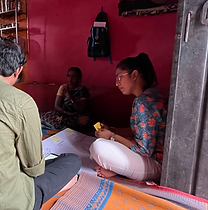The Project Marlin

How might we gain insight into the factors that influence the caregiver’s experience during their caregiving journey, to understand how it has impacted them and what receiving support may entail?
2023
The Caregiving Lab, Noora Health
team
Manju Pothen, Charley Vincent
& Simran Toor
role
design researchers, visual strategist
Overview
Being a caregiver to someone with a high-risk or life-threatening illness is deeply demanding and layered with complex challenges. Often, these nuances remain hidden. To design meaningful interventions, it’s essential to understand caregivers’ experiences and unmet needs in depth.
Project Marlin explores these experiences through design research methods. We conducted fieldwork in urban Bangalore and rural Bellary (Karnataka), uncovering insights and design directions that can strengthen existing efforts and spark new interventions.
The Name Project Marlin draws its name from the character Marlin in Finding Nemo—a clownfish known for his unwavering care and protection of his child. In nature too, clownfish are deeply committed caregivers, making them a fitting symbol for this exploration of caregiving in the context of high-risk and life-threatening illnesses.

Field Visit, Bellary District

Group Co-creation Session, Bellary Distrcit
Key Role
-
Led design research: Drafted research plans, developed interview protocols, and helped shape the inquiry framework.
-
Facilitated co-creation: Designed and conducted collaborative sessions with caregivers and care professionals to surface needs, ideas, and possible interventions.
-
Led visual communication: Created visuals and layouts for the final report, including illustrations that translated research findings into emotionally resonant formats.
Objectives
Through our research, we wanted to answer 3 main questions
• What are the needs of caregivers that are not being met and require support?
• What does it mean for caregivers to experience a sense of support?
• What are the positive and negative moments of being a caregiver?
Research Methods
For the first phase of the project, we engaged in design research activities in urban and rural contexts. Our focus was on caregivers from a lower socio-economic context who are taking care of a patient with a high-risk illness. We used the following methods for the research:

In-depth interviews with
participatory activities

Group Discussions using participatory activities

Contextual research of caregivers & facilities/
support in their communities

Secondary Research
Learning & Insights from Field
There is a myriad of challenges and barriers that each of these caregivers face, but there have been common and recurring patterns and emerging themes which tie them all together for a common understanding. Each theme is elaborated with insights, discussions and quotes from the field.
Key Emerging themes:
-
Lack of reliable and timely information that caregivers need
-
The intricacies of patient–caregiver relationships
-
Challenges navigating the healthcare system
-
Selfless care: Losing oneself in caregiving and the barriers to self-care
-
Gender, social norms, and family dynamics
-
The immense financial burden
-
The need for emotional support

Explore the full report for a
deeper dive into the insights
Design Directions & Outcomes
The insights derived from synthesizing the research findings highlighted two main direc-tions for us to dive into:
A. Information systems - focusing on timely and reliable information for caregivers
B. Support systems - Focusing on all forms of emotional support and addressing support for the inherent gender bias in caregiving tasks
With that in mind, we collaborated with caregivers in a co-creation session to deepen our exploration of emotional support. While the project is ongoing, three key outcomes have already been shared at platforms such as the World Health Summit and AVPN.

Information, inspiration & tools needed to create interventions that offer emotional support for caregivers


Storytelling through data visualisation that illustrates the emotional and physical load of caregiving